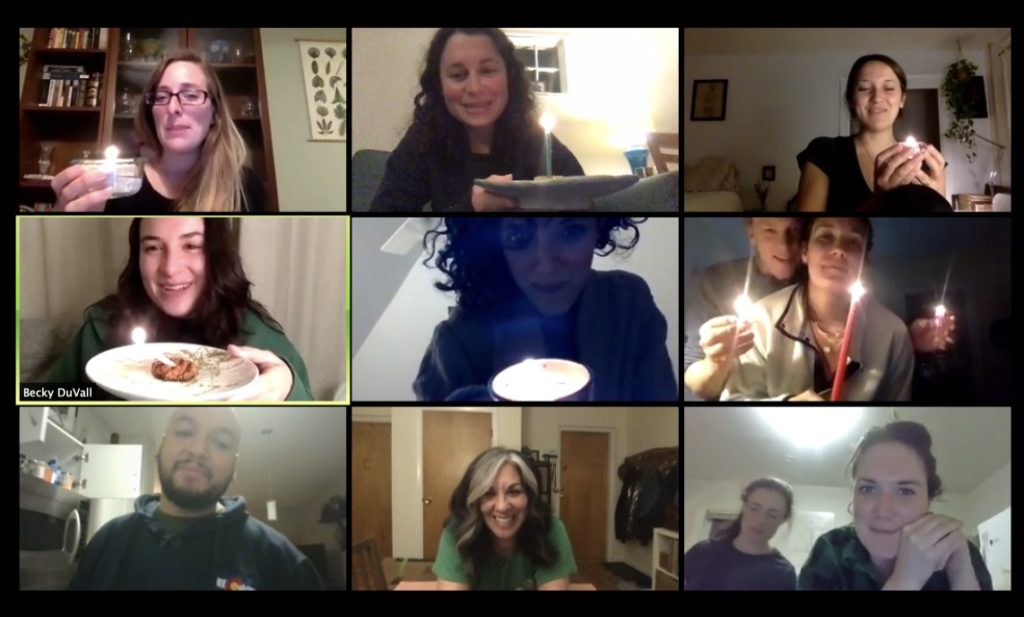Camaraderie Prevails in CSD’s Virtual Grad and Faculty Lounges

By Molly Loughman
In the Communication Science & Disorders (CSD) graduate program, much of the students’ work is defined by hands-on clinical experience and in-person interventions to aid people with speech and language disorders. With a pandemic raging, they must now adapt or even suspend those face-to-face interactions, leaving them unsure how the lost time will impact next steps in their careers.
Amid the abrupt loss and uncertainty, what remains steadfast is the department’s friendly and inclusive spirit – a sense of community normally found throughout the CSD floors in the Union Bank Building. As students and faculty have transitioned to remote teaching and learning like the rest of the College, they are finding ways to maintain their connections and camaraderie from a distance.
CSD GRAD LOUNGE
“It was a pretty quick transition and we’re a pretty close cohort,” said Clara Berry, who’s in her final semester of the graduate program. “We found out on a Tuesday that Wednesday would be our last class, and for us graduating this year, that meant our last class with each other in person, so that was pretty sad.”
When they weren’t in classes together, CSD grad students informally gathered inside their 9th-floor lounge room, and filled chairs and couches arranged around one large table. There, they hung out, snacked, talked, studied, played games and socialized.
“We had a really good time. It was a supportive atmosphere,” said Berry.” We all really valued that part of our experience. I think if we didn’t have that, I’m not sure we would have been as close as we are. To have downtime where you’re just focused on relationships with peers, there needs to be a space for that — And that’s what the CSD grad lounge was.”
Now, CSD grad students are sticking it out apart, but together via virtual conference tools such as Google Hangouts, where anyone at any time can start or join a video chat session.
“It’s definitely not the same, but it feels good to be able to chat. [Google Hangouts] still has that quality where it feels like you’re just chatting with whoever happens to be there, so it’s a little less formal than scheduling a call, or scheduling a FaceTime. We’ll play some word games or things like that,” said Berry.
And while socializing has been fun, the lounge has also served as a space for students to vent about the stresses surrounding the COVID-19 crisis and the uncertainty it breeds for things like clinical experience, graduation, and obtaining licensure in speech pathology.
“[The pandemic] is a big topic of conversation,” said Berry. “I think it helps when people hear directly from the people impacted. There’s a lot of anxiety, but we’re just trying to work it all out — so it’s good to have folks to talk to all the time about that. This field draws people who really enjoy communicating in-person with other people, so it’s been pretty hard for us to transition. It’s harder to read everyone’s facial expressions, body language and tone of voice. There’s a lot that you miss”
Berry added that although some connections may be lost in social distancing, others are being discovered.
“Everybody’s situation is unique and everyone’s struggling in one way or another, so it’s important to reach out to peers and faculty. This isolated situation we’re in requires us to actively engage with others and make those connections and get that support — because it’s not as easy to drop in and know that other people have the same issue you have. You have to go out there, virtually, to connect with others.”
CSD FACULTY LOUNGE
CSD Chair Ruth Grossman found inspiration in the virtual grad lounge. “It was such a good idea, I created a virtual faculty lounge.
“So now, there’s often an email that goes out [to CSD faculty] saying, ‘If anybody needs a break, I’ll be in the lounge.’ I’ve had coffee with colleagues in the morning. There may be happy hours that go on in later parts of the evening. We miss each other. We miss seeing each other in the hallways. I think [social interaction] is an important part of our jobs.”
Students and faculty are assimilating to virtual classes and office hours. Everybody is doing what’s best for themselves and their families while working and studying in an isolated COVID-19 world. But if possible, taking time for social interaction with people you normally would can be a source of release, said Grossman.
“We need that interaction to see where students are at and how to best support them; and same with each other as faculty,” she said. “Since those moments can’t happen accidentally or organically, I think we have to find ways to make them happen.”
Categories